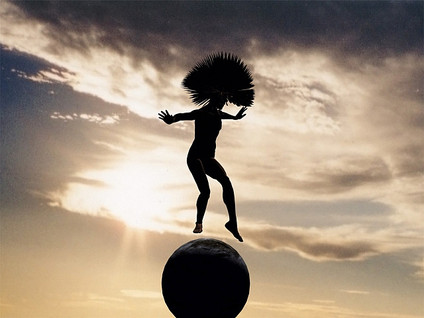Finding the Ego in Making A Difference
I often hear of people wanting to “Save the world.” Even though I do not think it needs saving[1], I relate to that phrase. I want to make a positive impact on the world around me, and I would prefer to do so in as “big” a way as possible.
What’s Behind the Desire to “Change the World”?
Yet I want to unpack what’s really going on when we say we want to make a positive impact, because in many ways the desire hides a form of materialism; a way for to reinforce a false ego, a way to project our own sense of inadequacy, impermanence, and fear onto the world around us instead of dealing with it.
Once we see these hidden sticking points, we can see that they keep us from being happy and loving one another, seeing the world more accurately, waking up to reality, and (ironically) making a positive impact. And then we can choose to operate a different way.
Of course sometimes a person truly discovers their unique gift and shares it in a way that makes an impact, and I do not mean to condemn that in any way. And sometimes a person makes a positive impact even when their motivation is not pure. But the purpose of this article is not to deconstruct positive impact, it is to uncover some of the unhealthy habits behind the desire to make a positive impact in service of greater awareness, healing, love.
Helping Others and Inadequacy
How can wanting to help people reinforce ego? How does making an impact relate to inadequacy?
Look at the underlying purpose. Helping others can be a way of judging our own sense of worth based on accumulations in the material world: in this case it is accumulating good deeds. The action of helping and acquiring good deeds is fine, but what about the motivation?
What Are You Missing?
Why do we want to accumulate good deeds? Are we accumulating things because we secretly think we are missing something? Like buying a sofa because our house is missing a comfortable place to sit? Like acquiring degrees because we are missing the credibility for the job we want? Like acquiring good deeds because we (think we) are missing value as a person?
Accepting Without Judgement, Then Going Deeper
This does not make acquiring sofas, credentials, or positive impacts “bad.” It is nice to have somewhere to sit, it is nice to learn, it is nice to help people. I encourage you to do all of these things.
I simply also encourage you to look at the underlying motivations and understand yourself better. You might be surprised and find better ways to align with this purpose, so you do not waste time getting things you do not need, holding on to things that are no longer important, and suffering or causing others to suffer unnecessarily.
What Is Your Deepest Motivation?
When I dig deep into my own desire to make an impact, I find that at least some of it is a way to atone for a sense of not being enough just as I am. I uncover a deep seated sense of inadequacy—that I must somehow earn my right to exist by contributing to society. In other words, I feel unworthy of existing, and I collect “positive impact points” to make myself feel more worthy.
And I uncover a secret fight against death.
Fighting Impermanence, Death, and Meaninglessness
Let’s face it: we are going to die, we are going to be forgotten, and this is absolutely terrifying.
Trying to make a positive impact is often a way of seeking to be remembered through improving the lives of others. We will survive death in the positive memories of those we helped. Plus, we give meaning to a life which fundamentally some part of us is not certain has meaning.
Making A Difference is Great
Finding meaning is really important, and making a difference is a fine thing to do. So is dentistry, or baking, or sailing; I am only encouraging you to be aware of the underlying motivations and let more love in with them, because it will be better for your own well-being and that of the people you love.
Think about it practically: if your motivation for starting a non-profit is (unconsciously) to combat personal unworthiness and impermanence, recognition will be even more important to you than success. And if someone else is doing the same thing, you are likely to compete with each other for personal value instead of collaborating to actually make a positive impact.
What to Do Instead
Finally we are left with the question: what do I do instead?
My inquiry and encouragement is more about how than what. To reiterate: The things I do are not a problem. For example, writing this article could be a way for me to convince myself that I am making a positive impact. It is not that I should stop writing articles, it is that I should connect with the motivation of love and let that guide what I write, instead of the motivation of guilt.
So go change the world! Just be aware of what motivates you, and try your best to come from a loving motivation. Try your best to live with integrity—if you want people to live peaceful, happy lives, make sure that your own life is peaceful and happy. Make sure that your desire for others to feel good does not keep you from feeling good.
____
[1] Humanity might—we certainly have the capacity to destroy human life—but life on Earth is not at stake. See Studies on wildlife in the Exclusion Zone of Chernobyl to read more about animal life flourishing in the aftermath of nuclear explosion.

